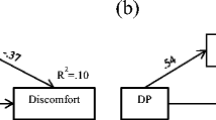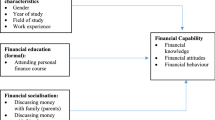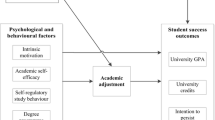Abstract
This study examined the relationship between financial knowledge and credit card behavior of college students. The widespread availability of credit cards has raised concerns over how college students might use those cards given the negative consequences (both immediate and long-term) associated with credit abuse and mismanagement. Using a sample of 1,354 students from a major southeastern university, results suggest that financial knowledge is a significant factor in the credit card decisions of college students. Students with higher scores on a measure of personal financial knowledge are more likely to engage in more responsible credit card use. Specific behaviors chosen have been associated with greater costs of borrowing and adverse economic consequences in the past.
Similar content being viewed by others
References
Ausubel, L. (1991). The failure of competition in the credit card market. American Economic Review, 81(1), 50–81.
Avard, S., Manton, E., English, D., & Walker, J. (2005). The financial knowledge of college freshmen. College Student Journal, 39(2), 321–338.
Baum, S., & Sanders, D. (1998). Life after debt: Results of the National Student Loan Survey. Journal of Student Financial Aid, 28(3), 7–23.
Borden, L. M., Lee, S. A., Serido, J., & Collins, D. (2008). Changing college students’ financial knowledge, attitudes, and behavior through seminar participation. Journal of Family and Economic Issues, 29(1), 23–40.
Braunsberger, K., Lucas, L. A., & Roach, D. (2004). The effectiveness of credit-card regulation for vulnerable consumers. Journal of Services Marketing, 18(5), 358–370.
Braunstein, S., & Welch, C. (2002). Financial literacy: An overview of practice, research, and policy. Federal Reserve Bulletin, 88, 445–457.
Bureau of Economic Analysis. (2008). Personal saving rate. Retrieved September 28, 2008, from http://www.bea.gov/briefrm/saving.htm.
Carswell, A. T. (2009). Does housing counseling change consumer financial behaviors? Evidence from Philadelphia. Journal of Family and Economic Issues, 30(4), 339–356.
Chen, H., & Volpe, R. P. (1998). An analysis of personal financial literacy among college students. Financial Services Review, 7(2), 107–128.
College Board. (2009). Trends in college pricing. Retrieved July 8, 2010, from http://www.trends-collegeboard.com/college_pricing/pdf/2009_Trends_College_Pricing.pdf.
Collins, J. M. (2007). Exploring the design of financial counseling for mortgage borrowers in default. Journal of Family and Economic Issues, 28(2), 207–226.
Credit Card Accountability Responsibility and Disclosure Act of 2009 (enacted), H. R. 627, 111th Cong., 1st Sess. (2009).
Cude, B. J., Lawrence, F. C., Lyons, A. C. Metzger, K., LeJeune, E., Marks, L., & Machtmes, K. (2006). College students and financial literacy: What they know and what we need to learn. Proceedings of the 33rd conference of the Eastern Family Economics-Resource Management Association, pp. 102–109.
Draut, T. (2005). Strapped: Why America’s 20- and 30-somethings can’t get ahead. New York: Doubleday.
Feinberg, R. A. (1986). Credit cards as spending facilitating stimuli: A conditioning interpretation. Journal of Consumer Research, 13(3), 348–356.
Fox, J., Bartholomae, S., & Lee, J. (2005). Building the case for financial education. Journal of Consumer Affairs, 39(1), 195–214.
Gutter, M., & Copur, Z. (2011). Financial behaviors and financial well-being of college students: Evidence from a national survey. Journal of Family and Economic Issues, Online First. doi:10.1007/s10834-011-9255-2.
Haynes-Bordas, R., Kiss, D. E., & Yilmazer, T. (2008). Effectiveness of financial education on financial management behavior and account usage: Evidence from a ‘second chance’ program. Journal of Family and Economic Issues, 29(3), 362–390.
Heller, D. E., & Marin, P. (Eds.). (2002). Who should we help? The negative social consequences of merit scholarships. Cambridge, MA: The Civil Rights Project at Harvard University.
Hilgert, M. A., Hogarth, J. M., & Beverly, S. G. (2003). Household financial management: The connection between knowledge and behavior. Federal Reserve Bulletin, 89, 309–322.
Jones, J. E. (2005). College students’ knowledge and use of credit. Financial Counseling and Planning, 16(2), 9–16.
Kara, A., Kaynak, E., & Kucukemiroglu, O. (1994). Credit card development strategies for the youth market: The use of conjoint analysis. International Journal of Bank Marketing, 12(6), 30–36.
Kidwell, B., & Turrisi, R. (2000). A cognitive analysis of credit card acquisition and college student financial development. Journal of College Student Development, 41(6), 589–598.
Liebermann, Y., & Flint-Goor, A. (1996). Message strategy by product-class type: A matching model. International Journal of Research in Marketing, 13(3), 237–249.
Lyons, A. C. (2004). A profile of financially at-risk college students. The Journal of Consumer Affairs, 38(1), 56–80.
Lyons, A. C. (2005). Financial education and program evaluation: Challenges and potentials for financial professionals. Journal of Personal Finance, 4(4), 56–68.
Lyons, A. C. (2007). Credit practices and financial education needs of Midwest college students. Working Paper, 2007-WP-23. Indianapolis, IN: Networks Financial Institute, Indiana State University.
Lyons, A. C. (2008). Risky credit card behavior of college students. In J. J. Xiao (Ed.), Advances in consumer financial behavior research (pp. 185–207). New York, NY: Springer Publishing Company.
Manning, R. D., & Kirshak, R. (2005). Credit cards on campus: Academic inquiry, objective empiricism, or advocacy research? NASFAA Journal of Student Financial Aid, 35(1), 39–48.
Markovich, C. A., & Devaney, S. A. (1997). College seniors’ personal finance knowledge and practices. Journal of Family and Consumer Sciences, 89(3), 61–65.
Munro, J., & Hirt, J. B. (1998). Credit cards and college students: Who pays, who benefits? Journal of College Student Development, 39(1), 51–57.
Nellie Mae. (2002). Undergraduate students and credit cards: An analysis of usage rates and trends. Retrieved September 15, 2006, from http://www.nelliemae.com/library/research.html.
Nellie Mae. (2005). Undergraduate students and credit cards: An analysis of usage rates and trends. Retrieved January 25, 2007, from http://www.nelliemae.com/library/research.html.
Norvilitis, J., & Santa Maria, P. (2002). Credit card debt on college campuses: Causes, consequences, and solutions. College Student Journal, 36(3), 356–364.
Peng, T. M., Bartholomae, S., Fox, J. J., & Cravener, G. (2007). The impact of personal finance education delivered in high school and college courses. Journal of Family and Economic Issues, 28(2), 265–284.
Pinto, M. B., Parente, D. H., & Palmer, T. S. (2001a). College student performance and credit card usage. Journal of College Student Development, 42(1), 49–58.
Pinto, M. B., Parente, D. H., & Palmer, T. S. (2001b). Credit card solicitation policies in higher education: Does “protecting” our students make a difference? Journal of College Student Development, 42(2), 169–172.
Ritzer, G. (1995). Expressing America: A critique of the Global Credit Card Society. Thousand Oaks, CA: Pine Forge Press.
Robb, C. A., Moody, B., & Abdel-Ghany, M. (2011). College student persistence to degree: The burden of debt. Journal of College Student Retention: Research, Theory, and Practice, 13(3), in press.
Robb, C. A., & Sharpe, D. L. (2009). Effect of personal financial knowledge on college students’ credit card behavior. Journal of Financial Counseling and Planning, 20(1), 25–40.
Robb, C. A., & Woodyard, A. S. (2011). Financial knowledge and ‘best practice’ behavior. Journal of Financial Counseling and Planning, 22(1), 36–46.
Roberts, J. A., & Jones, E. (2001). Money attitudes, credit card use, and compulsive buying among American college students. The Journal of Consumer Affairs, 35(21), 213–240.
Sallie Mae. (2009). How undergraduate students use credit cards. Sallie Mae’s National Study of Usage Rates and Trends. Retrieved January 10, 2010, from http://www.salliemae.com/about/news_info/research/credit_card_study/.
Scott, R. H., I. I. I. (2010). Credit card ownership among American high school seniors: 1997–2008. Journal of Family and Economic Issues, 31(2), 151–160.
Soman, D., & Cheema, A. (2002). The effect of credit on spending decisions: The role of the credit limit and credibility. Marketing Science, 21(1), 32–53.
Warwick, J., & Mansfield, P. (2000). Credit card consumers: College students’ knowledge and attitude. Journal of Consumer Marketing, 17(7), 617–626.
Willis, L. E. (2008). Against financial literacy education. Iowa Law Review, 94. Retrieved August 1, 2008, from http://lsr.nellco.org/upenn/wps/papers/208/.
Worthy, S. L., Jonkman, J., & Blinn-Pike, L. (2010). Sensation seeking, risk-taking, and problematic financial behaviors of college students. Journal of Family and Economic Issues, 31(2), 161–170.
Xiao, J. J., Tang, C., Serido, J., & Shim, S. (2011). Antecedents and consequences of risky credit behavior among college students: Application and extension of the Theory of Planned Behavior. Journal of Public Policy & Marketing, forthcoming.
Author information
Authors and Affiliations
Corresponding author
Rights and permissions
About this article
Cite this article
Robb, C.A. Financial Knowledge and Credit Card Behavior of College Students. J Fam Econ Iss 32, 690–698 (2011). https://doi.org/10.1007/s10834-011-9259-y
Published:
Issue Date:
DOI: https://doi.org/10.1007/s10834-011-9259-y




